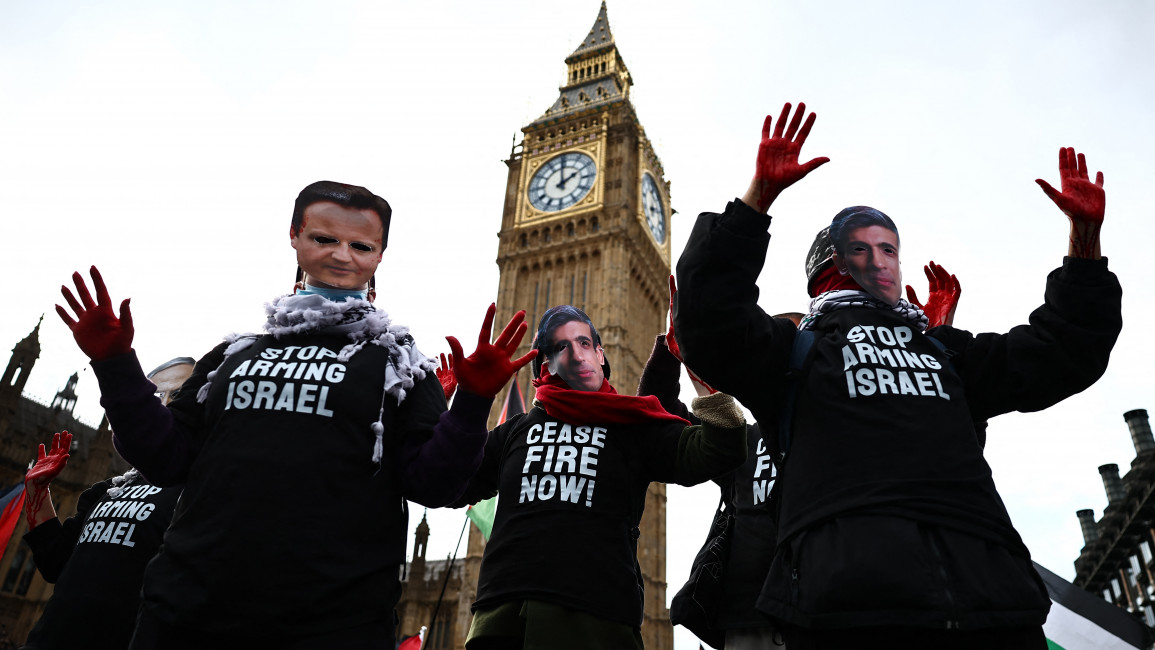Refusing to reflect on the root causes of radicalisation, the UK's counter-terrorism policies are just an excuse to criminalise Muslims, writes Nadeine Asbali.
Nadeine Asbali
12 Feb, 2024

British Muslims are outraged and disillusioned by their government's unchecked support for Israel's war on Gaza, writes Nadeine Asbali.
[Getty]
Over the last few decades, the term ‘radicalisation’ has become so politicised and laden with Islamophobic ideas that it can be hard to unpack what it actually means.
Radicalisation is “the action or process of causing someone to adopt radical positions on political or social issues”. To me, this sounds like a process that many of us go through as the adult world opens our eyes to the manifold inequalities in the systems that govern us.
Yet for many, ‘radical’ simply means any iteration of Islam that isn’t sanitised for the white gaze; to be ‘radical’ as a Muslim means being dangerous, extreme and even a terrorist.
Last week, the head of UK counter-terror policing said that Israel’s indiscriminate war on Palestinians in Gaza had created a “radicalisation moment”, with the potential to push many Muslims towards acts of terror, akin to the effect of the Iraq war on previous generations.
"Despite acknowledging that this is a pivotal and significant moment with the potential to disenfranchise British Muslims further than we already are, it’s clear that the state has no appetite to use this as an opportunity for introspection"
It’s not often that I find myself agreeing with anyone involved in the UK’s draconian and racist counter-terror apparatus, which has had a proven disproportionate impact on British Muslims, particularly children. But this time, I found myself agreeing because I feel it too.
I feel it in myself and in the shift in the people around me, the communities I live in and come from. Gaza has changed us. Many of us are angry, disillusioned and bereft.
We are disoriented from weekends spent protesting and evenings spent absorbing heinously graphic content of a genocide occurring in real time, only to have to go to work on a Monday morning to find the people around us talking about something as inane as the weather or last night’s TV shows.
I, for one, have never felt less British than when I see my elected representatives (including the so-called opposition) clamour for the support of the blood-stained illegal occupier that is inflicting this ethnic cleansing on the people of Gaza, which has killed more than 28,000 Palestinians.
But, despite acknowledging that this is a pivotal and significant moment with the potential to disenfranchise British Muslims further than we already are, it’s clear that the state has no appetite to use this as an opportunity for introspection.
No, there is no evidence at all that this moment will see the state reflect on how its own policies of enabling the massacres of Arabs and Muslims all over the world push young people to the very behaviours that it so rigorously criminalises.
One thing is clear: this “radicalisation moment” will serve as an excuse to police and securitise Muslims in even more invasive and unjust ways. What else could we possibly expect from a government that thrives on manufacturing the conditions of our disillusionment and then criminalising our righteous anger?
What more could we expect from a state built upon the colonisation of our bodies, lands and beliefs, that has no interest in our liberation or struggles?
Over the last few decades, the term ‘radicalisation’ has become so politicised and laden with Islamophobic ideas that it can be hard to unpack what it actually means.
Radicalisation is “the action or process of causing someone to adopt radical positions on political or social issues”. To me, this sounds like a process that many of us go through as the adult world opens our eyes to the manifold inequalities in the systems that govern us.
Yet for many, ‘radical’ simply means any iteration of Islam that isn’t sanitised for the white gaze; to be ‘radical’ as a Muslim means being dangerous, extreme and even a terrorist.
Last week, the head of UK counter-terror policing said that Israel’s indiscriminate war on Palestinians in Gaza had created a “radicalisation moment”, with the potential to push many Muslims towards acts of terror, akin to the effect of the Iraq war on previous generations.
"Despite acknowledging that this is a pivotal and significant moment with the potential to disenfranchise British Muslims further than we already are, it’s clear that the state has no appetite to use this as an opportunity for introspection"
It’s not often that I find myself agreeing with anyone involved in the UK’s draconian and racist counter-terror apparatus, which has had a proven disproportionate impact on British Muslims, particularly children. But this time, I found myself agreeing because I feel it too.
I feel it in myself and in the shift in the people around me, the communities I live in and come from. Gaza has changed us. Many of us are angry, disillusioned and bereft.
We are disoriented from weekends spent protesting and evenings spent absorbing heinously graphic content of a genocide occurring in real time, only to have to go to work on a Monday morning to find the people around us talking about something as inane as the weather or last night’s TV shows.
I, for one, have never felt less British than when I see my elected representatives (including the so-called opposition) clamour for the support of the blood-stained illegal occupier that is inflicting this ethnic cleansing on the people of Gaza, which has killed more than 28,000 Palestinians.
But, despite acknowledging that this is a pivotal and significant moment with the potential to disenfranchise British Muslims further than we already are, it’s clear that the state has no appetite to use this as an opportunity for introspection.
No, there is no evidence at all that this moment will see the state reflect on how its own policies of enabling the massacres of Arabs and Muslims all over the world push young people to the very behaviours that it so rigorously criminalises.
One thing is clear: this “radicalisation moment” will serve as an excuse to police and securitise Muslims in even more invasive and unjust ways. What else could we possibly expect from a government that thrives on manufacturing the conditions of our disillusionment and then criminalising our righteous anger?
What more could we expect from a state built upon the colonisation of our bodies, lands and beliefs, that has no interest in our liberation or struggles?
Perspectives Ross Slater
What we have seen is a violent uptick in the criminalisation of Muslims, even though the counter-terror machine acknowledges that it is Britain’s support for Israel that is causing this rising resentment amongst communities.
In the past four months of Israel’s assault, 33 people have been arrested in the UK under terrorism laws. This includes those who have been reprimanded by the police for protest signs, such as the teacher who received a police caution for holding a sign of Rishi Sunak and Suella Braverman next to coconuts.
In 2023, there was a 13% increase in referrals to Prevent with top policing figures saying that even eleven and twelve year olds are getting into “troubling conversations online”.
But is this all a sign of an increased risk of terrorism or is it evidence of a heightened atmosphere of Islamophobia in which support for Palestine is itself viewed as a precursor or symptom of terrorist activity?
"We are living in a time when calling for an end to violence carried out by a British ally with British complicity makes you a 'terrorist' but cheering on a genocide does not"
Even the briefest look at the state of the media over the last few months reveals the answer. Palestinians and their allies invited to speak on news shows face demands that they “condemn Hamas”, even when they speak about their families being killed.
In schools across the country, the same assumptions are being made. Shortly after 7th October schools received guidance from the education secretary that explicitly called for the protection of Jewish children, with millions pledged to ensure their safety, and the need to treat anti-Semitism seriously.
The same guidance did not even explicitly mention Muslims, Arabs, or Islamophobia, only making vague references alongside teachers’ duty to report anything suspicious to Prevent.
Some London schools saw extra police patrols stationed outside and “intelligence gathering” taking place on school grounds with teachers mandated to pass any evidence of “community tensions” onto police.
Voices Nadeine Asbali
We have seen peace marches calling for a ceasefire portrayed as “hate marches” by the former home secretary and celebrities and citizens alike losing their jobs for speaking out in support of the victims of genocide in Gaza.
We are living in a time when calling for an end to violence carried out by a British ally with British complicity makes you a ‘terrorist’ but cheering on a genocide does not.
It has never been clearer that the UK has no desire to view counter-terror through the lens of anything but surveillance, criminalisation and discrimination of Muslim communities whilst continuing its bloodlust imperial agenda overseas.
If this truly is a “radicalisation moment”, then it is one the UK’s own making. Until the state is able to accept this, then the apparatus Britons rely upon to keep them safe from terrorism is unfit for purpose.

Nadeine Asbali is a secondary school teacher in London.
Follow her on Twitter: @najourno
Opinions expressed here are the author's own, and do not necessarily reflect those of their employer, or of The New Arab and its editorial board or staff.
No comments:
Post a Comment